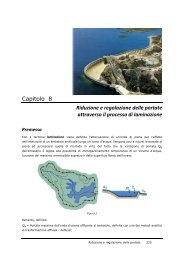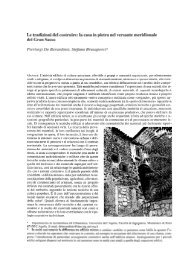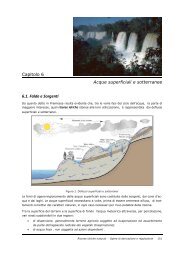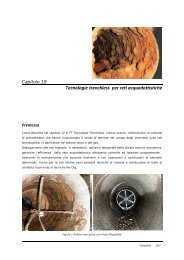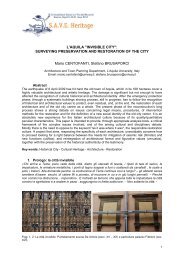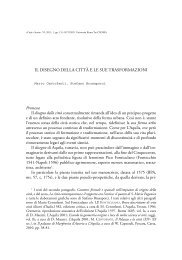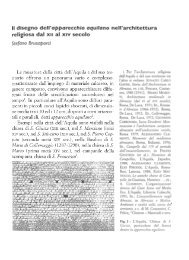- Page 1 and 2: La frammentazione degli ambienti na
- Page 4 and 5: FRAMMENTAZIONE AMBIENTALE CONNETTIV
- Page 8 and 9: INDICE Indice 7 Prefazione 11 Intro
- Page 10: Indice 9 - Letture differenti del c
- Page 14: Especially in tropical rainforest,
- Page 17 and 18: 16 Questo cambiamento di scala ha p
- Page 20: Guida alla lettura Il testo è sudd
- Page 23 and 24: 22 Matteo Guccione (APAT), con il q
- Page 28: PARTE I. FRAMMENTAZIONE AMBIENTALE
- Page 31 and 32: 30 Frammentazione ambientale - scom
- Page 33 and 34: 32 Frammentazione ambientale marine
- Page 35 and 36: 34 Frammentazione ambientale Alcune
- Page 37 and 38: 36 Frammentazione ambientale E’ p
- Page 39 and 40: 38 Frammentazione ambientale mentaz
- Page 42 and 43: 1.4 Effetti a livello individuale F
- Page 44 and 45: Frammentazione ambientale 43 cessiv
- Page 46: Frammentazione ambientale 45 sumibi
- Page 49 and 50: 48 Frammentazione ambientale fluttu
- Page 51 and 52: 50 Frammentazione ambientale dere a
- Page 53 and 54: 52 Frammentazione ambientale va e W
- Page 55 and 56: 54 Frammentazione ambientale popola
- Page 57 and 58: 56 Frammentazione ambientale “vor
- Page 59 and 60: 58 Frammentazione ambientale parole
- Page 62 and 63: 1.6 Effetti a livello di comunità
- Page 64 and 65: Frammentazione ambientale 63 Figura
- Page 66 and 67: Frammentazione ambientale 65 rate i
- Page 68 and 69: 1.7 Effetti a livello di ecosistema
- Page 70 and 71: Frammentazione ambientale 69 derati
- Page 72 and 73: 1.8 Effetti interni ed esterni ai f
- Page 74 and 75: Frammentazione ambientale 73 Figura
- Page 76 and 77:
Frammentazione ambientale 75 Saunde
- Page 78 and 79:
Frammentazione ambientale 77 datori
- Page 80 and 81:
Frammentazione ambientale 79 no, tu
- Page 82 and 83:
Frammentazione ambientale 81 floris
- Page 84:
Frammentazione ambientale 83 dalle
- Page 87 and 88:
86 Frammentazione ambientale 1.9 Il
- Page 89 and 90:
88 Frammentazione ambientale tament
- Page 91 and 92:
90 Frammentazione ambientale riguar
- Page 93 and 94:
92 Frammentazione ambientale si pu
- Page 95 and 96:
94 Frammentazione ambientale movime
- Page 97 and 98:
96 Frammentazione ambientale ne mol
- Page 99 and 100:
canali agiscano in alcuni casi da t
- Page 101 and 102:
100 Frammentazione ambientale 1.10
- Page 103 and 104:
102 Frammentazione ambientale Speci
- Page 105 and 106:
104 Frammentazione ambientale nacit
- Page 107 and 108:
106 Frammentazione ambientale ha re
- Page 109 and 110:
108 Frammentazione ambientale duzio
- Page 111 and 112:
110 Frammentazione ambientale Sitta
- Page 113 and 114:
112 Frammentazione ambientale Figur
- Page 115 and 116:
114 Frammentazione ambientale te in
- Page 117 and 118:
116 Frammentazione ambientale 2000)
- Page 119 and 120:
118 Frammentazione ambientale delle
- Page 121 and 122:
120 Frammentazione ambientale calme
- Page 123 and 124:
122 Frammentazione ambientale di Mo
- Page 125 and 126:
124 Frammentazione ambientale tà d
- Page 127 and 128:
126 Frammentazione ambientale Figur
- Page 129 and 130:
128 Frammentazione ambientale ne (3
- Page 131 and 132:
130 Frammentazione ambientale uno s
- Page 133 and 134:
132 Frammentazione ambientale polaz
- Page 135 and 136:
134 Frammentazione ambientale Abstr
- Page 138:
PARTE II. CONNETTIVITA’ Connettiv
- Page 141 and 142:
140 Connettività lo specifico, all
- Page 143 and 144:
142 Connettività ottimali finalizz
- Page 145 and 146:
144 Connettività L’analisi per s
- Page 148 and 149:
2.2 Corridoi, contiguità, connetti
- Page 150 and 151:
Connettività 149 Bennett (1999) so
- Page 152 and 153:
Connettività 151 - quelle che comp
- Page 154 and 155:
Connettività 153 ecologici (Dobson
- Page 156 and 157:
Connettività 155 piuttosto che tra
- Page 158 and 159:
Connettività 157 gruppi) soggette
- Page 160 and 161:
Connettività 159 no state ricostit
- Page 162 and 163:
Connettività 161 proxilofagi, lega
- Page 164 and 165:
Connettività 163 tario quando si v
- Page 166 and 167:
PARTE III. RETI ECOLOGICHE Reti eco
- Page 168 and 169:
3.1 Le reti ecologiche Reti ecologi
- Page 170 and 171:
Reti ecologiche 169 territoriali (A
- Page 172 and 173:
Reti ecologiche 171 - La lettura de
- Page 174 and 175:
Reti ecologiche 173 Figura 37. Diff
- Page 176:
Reti ecologiche 175 assicurare che
- Page 179 and 180:
178 Reti ecologiche Figura 38. Iter
- Page 181 and 182:
180 Reti ecologiche tra, tra l’al
- Page 183 and 184:
182 Reti ecologiche derata un esper
- Page 185 and 186:
184 Reti ecologiche la Natura (cfr.
- Page 187 and 188:
186 Reti ecologiche di comunità ca
- Page 189 and 190:
188 Reti ecologiche a tale scopo, s
- Page 191 and 192:
190 Reti ecologiche problematiche d
- Page 193 and 194:
192 Reti ecologiche sione, potrà c
- Page 195 and 196:
194 Reti ecologiche Figura 41. Diag
- Page 197 and 198:
196 Reti ecologiche l’Appennino c
- Page 199 and 200:
198 Reti ecologiche L’efficacia e
- Page 201 and 202:
200 Reti ecologiche La stratificazi
- Page 203 and 204:
202 Reti ecologiche analisi costitu
- Page 205 and 206:
per la individuazione e selezione d
- Page 207 and 208:
206 Reti ecologiche blems, should b
- Page 209 and 210:
208 Reti ecologiche Identification
- Page 211 and 212:
210 Amori G., Lapini L., 1997. Le s
- Page 213 and 214:
212 Beier P., Noss R.F., 1998. Do h
- Page 215 and 216:
214 Boitani L., 1986. Dalla parte d
- Page 217 and 218:
216 Bright P.W., Morris P.A., 1994.
- Page 219 and 220:
218 Capizzi D., Santini L., 1999d.
- Page 221 and 222:
220 Cosentino A., 2001. La valorizz
- Page 223 and 224:
222 Dupré E., Genovesi P., 1999. O
- Page 225 and 226:
224 Futuyma D.J., 1979. Biologia Ev
- Page 227 and 228:
226 Groppali R., 2003. Corsie d’a
- Page 229 and 230:
228 Helle P., 1985. Effects of fore
- Page 231 and 232:
230 Kozakiewicz M., Gortat T., Koza
- Page 233 and 234:
232 Mace G.M., Baillie J.E.M., Beis
- Page 235 and 236:
234 WWF “Le Foppe” (Trezzo sull
- Page 237 and 238:
236 stract V International Theriolo
- Page 239 and 240:
238 febbraio 2002, 27 pp. Pompilio
- Page 241 and 242:
240 Hystrix, 7: 229-238. Righetti A
- Page 243 and 244:
242 Anno accademico 2001/2002. Rela
- Page 245 and 246:
244 practice. Science, 191: 285-286
- Page 247 and 248:
246 Tilman D., May R.M., Lehman C.L
- Page 249:
248 Yanes M., Velasco J., Suárez F



